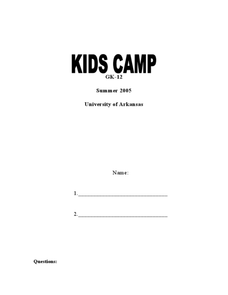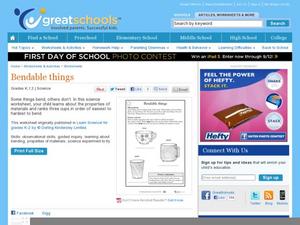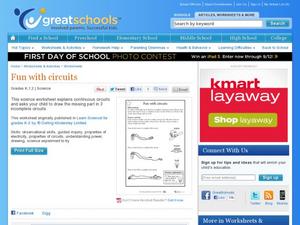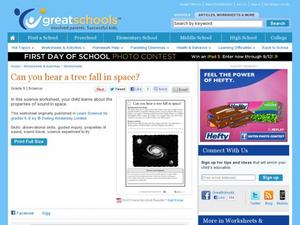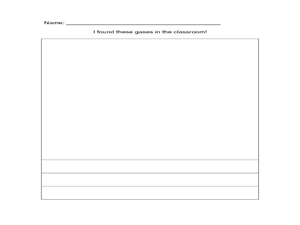Curated OER
Can You Make a Muscle?
Why are muscles important? Third graders study the different kinds and functions of muscles in the human body. After drawing arrows in an illustration to indicate where a muscle contraction would occur, they do their own experiment about...
Curated OER
On The Light Side
Kindergartners identify different sources of light in a science activity. They view pictures of a flashlight, a match, and a lamp, among others, and color the part of the picture that creates light. A science activity prompts them to...
Curated OER
Plant Life Cycles
Follow the life cycle of a dandelion with a lab sheet for kindergartners. They learn about the order of events in a dandelion's life, then put the stages of life in order. Can they describe the life cycle of a pumpkin? For extra...
Curated OER
Kids Camp
Here is a post-experiment lab sheet that is to be used with an activity involving diet coke and regular coke. There is also a graph that learners must complete which goes along with an experiment on density and volume of a variety of...
Curated OER
Bite on This!
Different types of teeth have different roles. Third graders study how molars, incisors, and canines function in a rabbit skull and a cat skull. After answering some questions about the teeth of herbivores and carnivores, kids...
Curated OER
Materials We Use
How can you tell if something is made out of wood, metal, or plastic? Kids use noise and visual cues to determine what various household items are made from. They then examine their toys at home and record the materials used to make...
Curated OER
Plant Groups
Compare different types of leaves in a science exploration. First, third graders identify common characteristics of various plants, such as daisies, fir needles, and cypress leaves. They then determine if the plants in each group are...
Curated OER
Bug Detective
What happens when a living thing dies? After reading a paragraph of background knowledge on the life cycle of bugs, third and fourth graders work through four clues to figure out which bug is which. When they finish, they can study the...
Curated OER
Oobleck
Here is a good lesson which aptly describes how to do the classic "Oobleck" lab with your young scientists. Unfortunately, the "Oobleck Investigation Sheet" in the plan doesn't open. However, this is a very clear description about how to...
Curated OER
Mentos Geyser! What's the Fizz Factor?
What is it that makes Mentos candy and cola such an explosive combination? Find out through scientific inquiry and experimentation. This presentation walks learners through the scientific process and allows them to speculate whether it...
Curated OER
Bendable Things
What kinds of cups can bend? Kindergartners find out with a straightforward science inquiry, designed to teach them about the properties of materials. They hypothesize about the flexibility of a china cup, a plastic cup, and a paper cup....
Curated OER
Flower Power
Determine which plants are flowering plants with a helpful lab sheet. Kids first observe illustrations of different plants, such as a carnation and a fern, then decide which plants produce flowers, spores, or cones. Use magazine pictures...
Curated OER
Fun with Circuits
What kinds of things need electricity to work? Kids draw the missing parts to three incomplete circuits in a worksheet about power and electricity. The science exploration asks them to build a circuit to a light bulb, but this might be a...
Curated OER
Can You Hear a Tree Fall in Space?
How does sound travel in space? Fifth graders investigate this question with a science activity, in which they research the properties of sound. Schedule a lab visit for individual Internet research, or include the activity after you...
Curated OER
Exercise and the Human Heart
Interpret data and learn about the human heart in one activity! After learning about the way blood flows in the body, fifth graders answer two questions about a graph displaying pulse rate. They then take their own pulses to find the...
Curated OER
Baking Ice Cream
For this science and cooking worksheet, students investigate how it is possible to make a baked ice cream dessert. Students follow the detailed recipe, then answer the questions where they hypothesize why the ice cream did not melt.
Curated OER
All About Teeth
Chomp chomp! Learn which teeth perform which tasks with a thorough instructional activity on molars, incisors, and canines. Based on descriptions of each kind of tooth, fifth graders label a diagram that points to particular teeth. They...
Curated OER
Will It Sink or Float?
Learners conduct a science experiment to determine whether a variety of objects will sink or float. They discuss the concept of density, and then make predictions about whether the objects will sink or float. They then conduct the...
Curated OER
Curricular Correlations
Here is a terrific way to teach your oceanographers about the effects that the ocean have on the weather and climate found throughout the world. In it, pupils engage in a science experiment designed to emulate how the ocean affects...
Curated OER
Putting the Ice in Hockey
Eighth grade physical science classes examine why the ice on which hockey is played is slippery. They do so by discussing phases of matter and the molecular motion in each. They read an article on a website and write out answers to...
Zebrafish in the Classroom
Worksheet on Genetics for Kindergarteners
Introduce the concept of genetics to your kindergartners with a science experiment about chromosomes in fish. After a quick overview of what chromosomes are, learners color different chromosomes to show that they come from the mom or the...
Curated OER
More Rocket Science
Students observe two rocket science experiments, and create a graph to demonstrate the results. They draw a picture and write an explanation of the results of the experiments.
Curated OER
Designing a Germination Experiment
Learners explore botany by participating in a seed experiment. In this plant nutrition lesson, students define several science experiment vocabulary terms like observation, treatment, and replicate. Learners utilize soaked seeds in a...
Curated OER
Matter: Solids Liquids and Gases
Young scholars participate in a science experiment to understand that matter takes up space. For this matter lesson, students experiment with solids, liquids and gases to recognize that matter is everywhere. Young scholars make...
Other popular searches
- Life Science Experiments
- Egg Science Experiments
- Hands on Science Experiments
- Space Science Experiments
- Food Science Experiments
- 5 Minute Science Experiments
- Simple Science Experiments
- Air Science Experiments
- Fun Science Experiments
- Earth Science Experiments
- Science Experiments Units
- Sea Life Science Experiments





